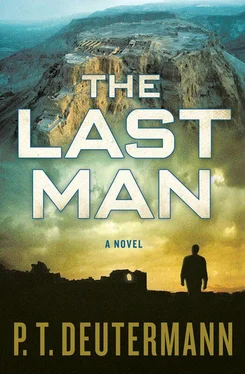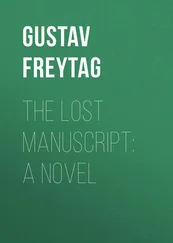Eleazar’s back arched in agony, the blood now running like a river from his open mouth, his feet kicking helplessly alongside Judah’s legs.
“‘Let us die before we become slaves under our enemies,’” Judah recited, as he twisted the blade, severing every vital link to life within Eleazar’s body, “‘and let us go out of this world, together with our children and our wives, in a state of freedom, so that we leave an example which shall at once cause their astonishment at our death, and their admiration at our hardiness.’”
Eleazar collapsed back against the wall, a great wheezing, bubbling sigh escaping from his mouth and nose as the blood slowed, his eyes fixed now in that rigid contemplation known only to the dead.
Judah withdrew the blade and straightened up, exhaling forcefully. His arm was shaking, and he found himself weeping. He had followed this man through the hell of civil war, the immolation of the Jewish state and most of its population, and finally the long and dreadful siege in this God-forsaken place, only to have Eleazar, the commander, the leader, the fiery heart of the revolt, lose his nerve? He could not abide it.
A gust of wind blew smoke into the palace, stirring once again the reek of mass death coming from down the passageways. The rumble of the drums seemed to be growing louder. The formations must be massing down below the ramp.
An hour at the most until dawn. It was time to fire the palace. Then he would slip down the Serpent Path to the great cistern. To his own end. Unlike Eleazar, he had no doubts that he could do what he must. He was anxious to die.
* * *
Judah had to lower himself on a rope over the eastern parapets, the gate to the Serpent Path having long been sealed by the defenders. He felt doubly exposed as he slid down, because this was the sunrise side of the mountain. The Zealots had seen Roman patrols on the Serpent Path, but always down toward the bottom. General Silva had allowed the path itself to remain open in hopes of encouraging defections from the mountain. He had closed it only after discovering that Jews were using it to join the defenders.
He crunched down into the loose sand and gravel below the walls and flipped the rope a couple of times until the special knot let go, dropping the full length of it at his feet. He gathered it up and trudged down the path, moving from boulder to boulder as best he could, stopping to listen for the tramp of Roman sandals. The air was fresher here, as the diurnal winds prepared to change. The smells were no longer of death and smoke but of brine and long-burned sand. He reached the tiny cave, dragging the coil of rope behind him to smooth out his tracks, and then stepped inside. There had been a rain two weeks ago, and the sand on the floor of the cave was still wet.
He stopped to rest, very much aware now that the opening of the cave was gray against the darkness inside. Soon the Romans would advance up the siege ramp. What a sight they would find! He had never found the missing children and the two women. Perhaps they had taken refuge in one of the dry cisterns at the southern end of the fortress. A few inconsequential survivors wouldn’t be all bad, he thought. The Romans would find them and hear firsthand what had befallen their triumph. Then, unfortunately, they’d throw them off the ramparts.
It was time. He went to the back of the cave and began to dig away the sand until he exposed the hole into the great cavern. It was covered with a closely fitted wooden hatch, which he was able to pull up, turn on its side, and then drop through the hole. It took a frighteningly long time before he heard the crash of splintering boards below. The cavern was at least sixty cubits from the ceiling to the floor. Then he moved more sand, exposing the heavy stone slab that had been buried next to the hole. It was much too heavy for one man to move without levers, but they had prepositioned five small round logs under it to serve as rollers. On the top was an iron ring, bolted to an iron shaft that penetrated the slab. There was a smaller ring on the bottom side. He attached the rope to this underside ring. Then he rolled the slab over to the very edge of the hole, leaving enough room for him to climb through. He used his sandals to sweep mounds of sand right next to the hole and on top of the slab, so that the sand would fall in behind the stone and conceal it.
He sat for a moment on the edge of the hole. Once he lowered himself onto the rope, the slab would begin to move. He would have a few seconds to get beneath it before it rolled into the cambered hole, sealing him into the cave forever.
It was well and truly over. His entire life. Old as he was, he could still remember it all, even as far back as the heady days in Galilee when he’d joined the wild bunch, after having been expelled from his family and his village for mocking the religious pretensions of his older brother. The expulsion, when he was just fifteen years old, had come as no surprise, really. He had been a rebellious child from the first, a fighter and a scrapper and much more interested in hunting and trapping in the hills than in boring scripture and the study of long-dead prophets. Increasingly forced to endure endless lectures on how much better his older brother was, how much more worthy, devoted, scripturally brilliant, such a good son, all of it, he jumped at the chance to join the small band of ruffian teenagers who roamed the northern hills of Galilee, living off the land and the occasional stolen herd animal. His parents had renounced him and stricken his name, while his brother, the saint, went off to study with the priests and scholars about minutiae in the holy book.
He stopped to listen. Something was different. The drums. The drums had stopped. He closed his eyes and recaptured the images from the palace above and the desperate, bloody hovels in the casemates, the glorious defenders of Jewish honor and history reduced now to sodden lumps of carrion.
For a moment, his faith in the cause almost broke.
Implacable Rome. Vengeful Rome. Divine Rome. Conquerors of the whole world, masters of the visible horizon who even called the entire middle sea Mare Nostrum, our sea. Challenged by tiny, insignificant Judaea.
They had been mad to even imagine they could break the Roman yoke.
It was time to end it. The treasures were secure. The people’s testaments were all collected at the bottom. The Romans were coming.
He sighed, grabbed the rope, turned sideways, put his weight on it, and slid down beneath the edges of the slab hole. Nothing happened for a moment, and then the slab responded, moving toward his face as he slid farther down beneath the rectangular opening, the wooden rollers dropping through, banging off his shoulders, and then the slab seating with a granitic, sandy thump, leaving him suspended in utter darkness. The roller logs crashed down onto the rock floor of the cavern a very long way beneath him. He listened and thought he could hear the whispering flow of sand covering the slab. Hand over hand, his fingers clutching the rough knots, he lowered himself into stygian darkness.
He continued to slide down the rope until his sandals came up against the big knot at the bottom. He could see absolutely nothing; the darkness was profound. He tried to visualize the great sphere of the cavern but had no way to orient himself, so he began to swing, pumping the rope back and forth until he was swinging through the darkness, initially in one line but then in a sweeping circle, wider and wider, until he finally felt his feet bang up against the rock wall. He kept it up, expanding the arc, until one of his feet engaged the scaffolding wall they had erected. It was a lashed pole-and-crosspiece affair, rising from the floor of the cavern to the entrance of the side cave.
Читать дальше












